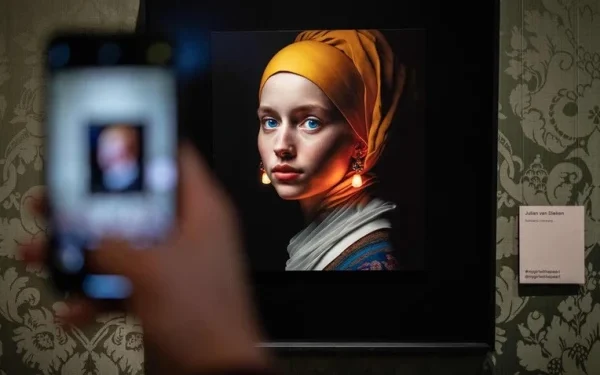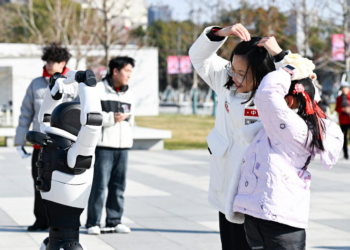Introduction: A New Age Dilemma for Artists
As artificial intelligence (AI) continues to revolutionize nearly every industry, from healthcare and finance to entertainment and education, artists across the globe have expressed growing concerns. AI-generated artworks, scripts, music, and even poetry are being churned out by sophisticated algorithms. While these advances demonstrate technological progress, they also pose serious challenges for human creators. Amid these concerns, a groundbreaking new app called ARK has been launched to safeguard human-made artistic creations from the encroachment of AI interference.
The Genesis of the Idea
In 2008, screenwriter Ed Bennett encountered a pivotal moment in his career. He read an article that described how an AI system had successfully written a screenplay. This revelation was both fascinating and alarming, sparking deep reflection about the future of creative industries. Would AI eventually replace screenwriters, artists, and musicians? Would human creativity be devalued?
Motivated by these questions and fueled by a desire to protect the sanctity of human creativity, Bennett began envisioning a solution. Fast-forward nearly two decades, and he, alongside his friend and creative collaborator Jamie Hartman, has introduced ARK—a digital fortress for human-made art.
Introducing ARK: A Revolutionary Safeguard
ARK is not just another app; it is a digital platform specifically engineered to track, preserve, and authenticate creative works from their inception to final product. The aim is simple yet profound: to ensure that human creativity retains its value and is not overshadowed or stolen by artificial intelligence.
According to Hartman, the idea behind ARK stems from the realization that AI is rapidly becoming capable of replicating human artistic abilities. “The era of AI has arrived, and it is taking over many jobs, including those in the creative sector,” he said. “Our app strictly prevents AI interference because we believe that only the artist can decide the worth of their creation. We own it, and we must protect it.”
Key Features of ARK: A Multilayered Defense System
ARK incorporates several advanced technological features to create a robust and secure environment for creators:
- Non-Disclosure Agreements (NDAs): The app allows artists to protect their work through legally binding NDAs, ensuring that their ideas remain confidential until they are ready to be shared with the world.
- Biometric Verification: In a bid to verify the true identity of creators, ARK uses biometric data such as fingerprints or facial recognition to confirm the originality of submitted work.
- Blockchain-Backed Timestamps: One of ARK’s most innovative features is its use of blockchain technology to timestamp each stage of the creative process. This immutable ledger helps establish clear ownership and timelines, which can be critical in resolving disputes over intellectual property.
- Creative Process Archiving: ARK enables users to save drafts, revisions, and conceptual stages of their work, offering a complete chronicle of their creative journey. This is particularly important in demonstrating that a piece was not AI-generated.
Challenging the Final-Product Paradigm
One of ARK’s most compelling philosophical stances is its challenge to the traditional notion that only the final product of an artistic endeavor holds value. Ed Bennett argues that every phase of the creative process is imbued with human thought, emotion, and effort—and therefore deserves protection.
“It’s not just about the finished screenplay, painting, or song,” Bennett explained. “It’s about the notes you jotted down at midnight, the rough sketches on your tablet, the voice memos you recorded on your phone. That entire journey is human, and it deserves to be respected.”
Addressing a Growing Threat
AI models like ChatGPT, DALL-E, and others have made it possible to generate written content, visual art, and even music with minimal human input. This has led to a surge in concerns about intellectual property theft, plagiarism, and the blurring lines between human and machine-made works.
The launch of ARK is a direct response to these concerns. By providing a comprehensive suite of tools aimed at protecting creative ownership, the app empowers artists to assert their rights in an increasingly AI-dominated world.
A Broader Impact on Creative Industries
ARK is expected to have wide-reaching implications not only for individual artists but also for the broader entertainment, publishing, and design industries. Music producers, filmmakers, novelists, and digital content creators stand to benefit from a tool that affirms their authorship and guards against unauthorized use or AI imitation.
Jamie Hartman emphasizes that ARK is as much about validation as it is about protection. “Artists have always been the soul of culture,” he said. “As we step further into the digital age, it’s crucial that we don’t lose sight of that. ARK is here to ensure that human creativity continues to be celebrated, respected, and preserved.”
Global Relevance and Future Expansion
Given the universal nature of the problem, ARK’s appeal is not limited to any one region or industry. It holds promise for global adoption, particularly as debates about AI ethics and regulation intensify worldwide.
The creators of ARK have announced plans to expand the app’s functionalities in future updates, including multilingual support, integration with creative software platforms, and tools for collaborative projects. There are also discussions about partnerships with legal experts and copyright organizations to further solidify the app’s credibility and effectiveness.
Conclusion: Reclaiming the Human Touch
In a world increasingly influenced by artificial intelligence, ARK serves as a beacon of hope for human artists. It reaffirms the unique value of human creativity and offers a practical solution to one of the most pressing issues of our time. As AI continues to evolve, tools like ARK will play an essential role in maintaining the delicate balance between technological advancement and the preservation of human expression.
By championing originality, transparency, and ownership, ARK is not just protecting art—it’s preserving the soul of creativity in the digital age.

























